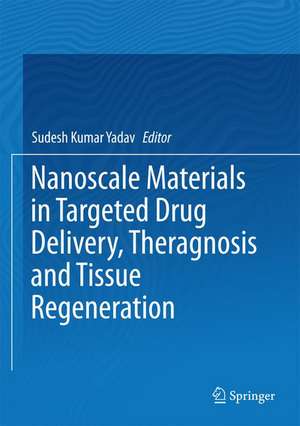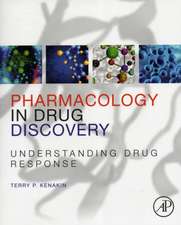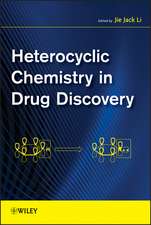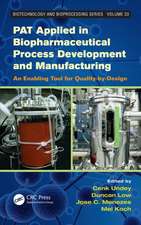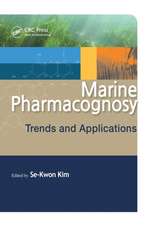Nanoscale Materials in Targeted Drug Delivery, Theragnosis and Tissue Regeneration
Editat de Sudesh Kumar Yadaven Limba Engleză Hardback – 13 iun 2016
This book is the first of its kind to offer a comprehensive and up-to-date discussion of the use of nanoscale materials for biomedical applications, with a particular focus on drug delivery, theragnosis and tissue regeneration. It also describes in detail the methods used in the preparation of nanoparticles. Response of nanoparticles in biological systems are also explored.
Nanotechnology has led to the advent of a new field, nanomedicine, which focuses on the use of nanomaterials as drug-delivery vehicles to develop highly selective and effective drugs. The combination of molecular imaging and nanotechnology has produced theragnostic nanoparticles, which allow the simultaneous detection and monitoring of diseases. Nanotechnology can also be combined with biomaterials to create scaffolds for tissue regeneration. Further, significant advances have been made in the areas of drug delivery, theragnostic nanoparticles and tissue regeneration materials. Some nanomedicines and tissue regeneration materials are already commercially available, while others are undergoing clinical trials, and promising results have been documented.
Despite the rapid advances in nanomedicine, there is a relative dearth of literature on the biomedical applications of nanoscale materials.
| Toate formatele și edițiile | Preț | Express |
|---|---|---|
| Paperback (1) | 973.08 lei 38-44 zile | |
| Springer Nature Singapore – 6 iun 2018 | 973.08 lei 38-44 zile | |
| Hardback (1) | 1105.04 lei 3-5 săpt. | |
| Springer Nature Singapore – 13 iun 2016 | 1105.04 lei 3-5 săpt. |
Preț: 1105.04 lei
Preț vechi: 1163.20 lei
-5% Nou
Puncte Express: 1658
Preț estimativ în valută:
211.48€ • 218.47$ • 176.00£
211.48€ • 218.47$ • 176.00£
Carte disponibilă
Livrare economică 05-19 martie
Preluare comenzi: 021 569.72.76
Specificații
ISBN-13: 9789811008177
ISBN-10: 9811008175
Pagini: 393
Ilustrații: XIX, 172 p. 11 illus., 10 illus. in color.
Dimensiuni: 178 x 254 x 16 mm
Greutate: 0.69 kg
Ediția:1st ed. 2016
Editura: Springer Nature Singapore
Colecția Springer
Locul publicării:Singapore, Singapore
ISBN-10: 9811008175
Pagini: 393
Ilustrații: XIX, 172 p. 11 illus., 10 illus. in color.
Dimensiuni: 178 x 254 x 16 mm
Greutate: 0.69 kg
Ediția:1st ed. 2016
Editura: Springer Nature Singapore
Colecția Springer
Locul publicării:Singapore, Singapore
Cuprins
1. Nanoscale materials in targeted drug delivery.- 2. Biodegradable nanoparticles and their in vivo fate.- 3. Metallic nanoparticles, toxicity issues and applications in medicine.- 4. Liposomal and phytosomal formulations.- 5. Nanocellulose and nanocomposites.- 6. Theragnosis: Nanoparticles as a tool for simultaneous therapy and diagnosis.- 7. Cellular response of therapeutic nanoparticles.
Notă biografică
Dr. Sudesh Kumar Yadav (DOB: 02-01-1976; POB: Bhiwani, Haryana) obtained his MSc in 1999 and PhD in 2002 from the Department of Biochemistry, CCS Haryana Agricultural University, Hisar. Subsequently, he worked as post-doctoral fellow at ICGEB, New Delhi (2002-2004). He joined CSIR-Institute of Himalayan Bioresource Technology, Palampur in 2004 and presently working there as principal scientist. Under his guidance, six students have obtained their PhD degrees. He has been working in the area of plant metabolic engineering and nanobiology.
In the plant metabolic engineering area, he has significantly contributed through his research towards understanding the caffeine metabolism in tea and reducing its caffeine levels through gene silencing. Also, flavonoid biosynthetic pathway genes from tea were explored in raising transgenic tobacco plants with improved flavonoid and antioxidants potential. His research work has provided the evidence to the production of low-seeded fruits through decreasing flavonols level by silencing of flavonol synthase. Currently, his focus is on understanding epigenetic regulation and role of small RNAs in the metabolic processes of plants. In nanobiology, his main work is on the exploration of plants for the synthesis of noble metallic nanoparticles and characterizing their phytochemicals involved therein. Such nanoparticles are very useful in various agricultural, medical and food applications. Secondly, he has been working towards improving the solubility, bioavailability and efficacy of important phytomolecules possessing activities like antioxidant, antimicrobial and anticancer.
He has published more than 100 research articles in peer reviewed journals and 10 book chapters so far. For his outstanding research contributions in the area of plant sciences, he has been honoured with many prestigious awards; Indian National Science Academy (INSA)-Young Scientist Award-2008, The National Academy of Science, India (NASI)-Platinum Jubilee Young Scientist Award-2009, Council of Scientific and Industrial Research (CSIR)-Young Scientist Award-2010. He has been awarded BOYSCAST Fellowship during 2008 by DST, GOI for conducting advanced research at UCR, Riverside, USA for one year. He has been also selected “NAAS-Associate” by the National Academy of Agricultural Sciences from 2013 and conferred “Prof. Hira Lal Chakravarty Memorial Award” of Indian Science Congress Association (ISCA) for the year 2012-2013 during 100th Session of Indian Science Congress at Kolkata. Adding another feather to his achievements, he has now been selected by Haryana State Council for Science and Technology, Department of Science and Technology, Govt. of Haryana for the “Haryana Yuva Vigyan Ratna Award” 2011-12 for his excellent research contributions.
Textul de pe ultima copertă
This book is the first of its kind to offer a comprehensive and up-to-date discussion of the use of nanoscale materials for biomedical applications, with a particular focus on drug delivery, theragnosis and tissue regeneration. It also describes in detail the methods used in the preparation of nanoparticles. Response of nanoparticles in biological systems are also explored.
Nanotechnology has led to the advent of a new field, nanomedicine, which focuses on the use of nanomaterials as drug-delivery vehicles to develop highly selective and effective drugs. The combination of molecular imaging and nanotechnology has produced theragnostic nanoparticles, which allow the simultaneous detection and monitoring of diseases. Nanotechnology can also be combined with biomaterials to create scaffolds for tissue regeneration. Further, significant advances have been made in the areas of drug delivery, theragnostic nanoparticles and tissue regeneration materials. Some nanomedicines and tissue regeneration materials are already commercially available, while others are undergoing clinical trials, and promising results have been documented.
Despite the rapid advances in nanomedicine, there is a relative dearth of literature on the biomedical applications of nanoscale materials.
Nanotechnology has led to the advent of a new field, nanomedicine, which focuses on the use of nanomaterials as drug-delivery vehicles to develop highly selective and effective drugs. The combination of molecular imaging and nanotechnology has produced theragnostic nanoparticles, which allow the simultaneous detection and monitoring of diseases. Nanotechnology can also be combined with biomaterials to create scaffolds for tissue regeneration. Further, significant advances have been made in the areas of drug delivery, theragnostic nanoparticles and tissue regeneration materials. Some nanomedicines and tissue regeneration materials are already commercially available, while others are undergoing clinical trials, and promising results have been documented.
Despite the rapid advances in nanomedicine, there is a relative dearth of literature on the biomedical applications of nanoscale materials.
Caracteristici
Offers comprehensive and cutting-edge information on drug delivery
Describes in detail the methods used in the preparation of nanoparticles
Describes biomedical applications of nanoscale materials that can greatly benefit society
Includes supplementary material: sn.pub/extras
Describes in detail the methods used in the preparation of nanoparticles
Describes biomedical applications of nanoscale materials that can greatly benefit society
Includes supplementary material: sn.pub/extras
